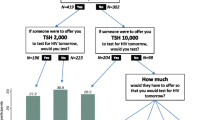Abstract
Should HIV/AIDS testing be required for health care workers and patients? This study compared the perceptions of 64 health care professionals and 97 nursing students on mandatory HIV testing, the risk of accidental infection, the appropriate industry response to infection, and the placement of costs. Significant differences were found between the two groups. While health care professionals favored testing for patients, students favored mandatory testing for both health care workers and patients. Students also viewed the risk of HIV/AIDS infection by a patient as significantly higher than did health care workers. Overall younger respondents tended to favor mandatory testing and also thought that hospitals should bear the cost.
Similar content being viewed by others
References
American Health Consultants (1993). 'Common sense about AIDS.' AIDS Alert 8 (4), 56.
American Nurses Association (6 September 1991). Position statements: HIV testing. Online: http://www.nursingworld.org/readroom/position/blood/bltest.html.
Americans with Disabilities Act of 1990, Pub. L. No. 101-336, Section 101.
Beck, D. M. (1992). 'Mandatory HIV testing for healthcare workers: is it ethical?' Nursing Forum 27 (4), 9-14.
aids/pubs/rt/rapidfs.html.
Centers for Disease Control and Prevention (1998b). HIV/AIDS Surveillance Report 10 (2), 26.
Connors, J. and P. Heaven (1995). 'Health beliefs and attitudes toward people living with HIV/AIDS.' Journal of Applied Social Psychology 25 (10), 922-931.
Crawford, A. M. (1996). 'Stigma associated with AIDS: a meta-analysis.' Journal of Applied Social Psychology 26 (5), 398-416.
DiIorio, C. (1997). 'Neuroscience nurses' intentions to care for persons with HIV/AIDS.' Journal of Neuroscience Nursing 29 (1) 50-55.
Green, G. and S. Platt (1997). 'Fear and loathing in health care settings reported by people with HIV.' Sociology of Health and Illness 19 (1), 70-92.
Henderson, C. W. (1998). 'U.S. AIDS groups reverse stand and call for testing.' AIDS Weekly Plus 7 September.
Noll, M. L., R. Merrell, and J. F. Byers (1993). 'Mandatory HIV testing: a timely controversy.' Dimensions of Critical Care Nursing 12 (2), 92-99.
Petesch, P. J. (1998). 'The ADA, HIV, and risk management strategies.' Legal Report (summer), 1-6.
Phillips, K. A., R. A. Lowe, J. G. Kahn, P. Lurie, A. L. Avins, and D. Ciccarone (1994). 'The cost-effectiveness of HIV testing of physicians and dentists in the United States.' JAMA 271 (11), 851-858.
Pogash, C. (1992). 'AIDS.' Working Woman (October), 76-102.
Silberner, J. (1991). 'AIDS and votes.' U.S. World News and World Report, 10.
Sixth patient of dentist with AIDS tests positive (1993). The Wall Street Journal (7 May, B6).
U.S. Department of Health and Human Services (1986). Surgeon General's Report on Acquired Immune Deficiency Syndrome. pp. 13-14.
Waldholz, M. (1999). 'Bristol-Myers heeds calls to bolster war against HIV in Africa.' The Wall Street Journal (6 May, A1).
Wyld, D. C., S. D. Cappel, and D. E. Hallock (1992). 'The right to know and the right to privacy: HIV testing and health care management.' Health Care Supervisor 10, 56-66.
Author information
Authors and Affiliations
Rights and permissions
About this article
Cite this article
Beggs, J.M., Jernigan, I.E. Mandatory HIV/AIDS Testing: An Ethical Issue. International Journal of Value-Based Management 14, 131–146 (2001). https://doi.org/10.1023/A:1011113614901
Issue Date:
DOI: https://doi.org/10.1023/A:1011113614901




